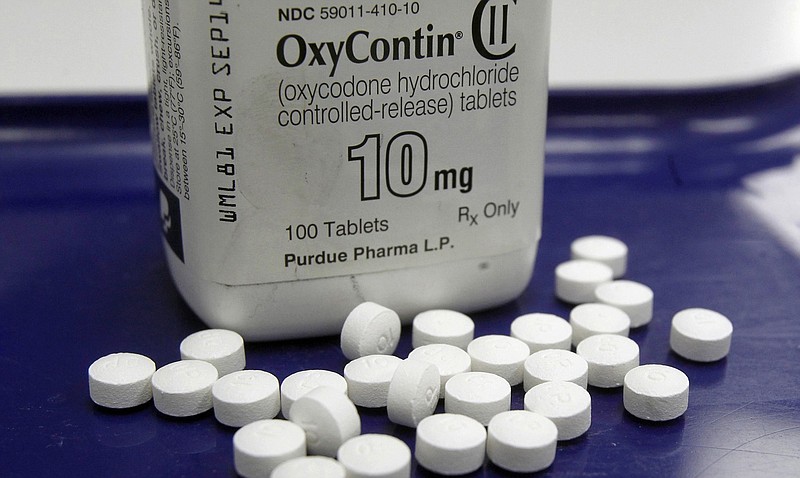Consulting giant McKinsey & Co. agreed to a $573 million settlement reported Thursday for its role in advising pharmaceutical companies on how to push opioids during a national drug crisis.
The settlement agreement was reached with attorneys general in 47 states, including Arkansas, as well as the District of Columbia and five U.S. territories after lawsuits alleged the consulting firm helped major drug companies boost opioid sales, exacerbating a nationwide crisis over addiction and overdose.
As part of the settlement, Arkansas will receive $5.4 million, which will be put toward programs that will abate the problems caused by the opioid crisis, according to a news release from Attorney General Leslie Rutledge. McKinsey will have 60 days to pay out most of the settlement after a judge signs off on the agreement.
"The opioid epidemic has torn Arkansas families apart and eroded communities," Rutledge said in a statement. "We will never forget the damage that has been done. This settlement will not get loved ones back but it is a step in the right direction to remedy the wrong these opioid companies have caused."
[Video not showing up above? Click here to watch » https://www.youtube.com/watch?v=3KcLyknZQSc]
The settlement was made as the public health officials say the coronavirus pandemic has caused a setback in the fight against opioids. Opioid abuse had been trending downward before the pandemic, but experts fear the effects of the coronavirus and social isolation have caused a regression.
Litigation remains pending against other opioid manufacturers for their roles in the prescription drug epidemic, which has contributed to the deaths of more than 470,000 Americans over the past two decades.
In a complaint filed against McKinsey, Rutledge's office alleged the consulting firm helped Purdue Pharma, maker of OxyContin, design marketing plans to push the drug. McKinsey also targeted doctors who wrote the most prescriptions for the most patients, aiming to "Turbocharge Purdue's Sales Engine," the complaint said.
As a part of the settlement, McKinsey agreed to publicly release its communications with Purdue Pharma along with other drug manufacturers: Endo Pharmaceuticals, Johnson & Johnson and Mallinckrodt, according to The Associated Press.
Materials from lawsuits against Purdue Pharma show the close relationship it had with McKinsey when it came to pushing OxyContin with promises from the consulting firm that new sales tactics would increase sales by as much as $400 million annually, the New York Times reported.
Some of the new sales tactics suggested by McKinsey encouraged Purdue Pharma to push the drug with claims it reduced stress in patients and made them feel more optimistic and less isolated. Some of the consulting from McKinsey also included counter-messaging against mothers who lost teenagers to drug overdoses, according to The New York Times.
"We deeply regret that we did not adequately acknowledge the tragic consequences of the epidemic unfolding in our communities," Kevin Sneader, McKinsey's global managing partner, said in a statement Thursday. "With this agreement, we hope to be part of the solution to the opioid crisis in the U.S."
In addition to the multistate settlement, Washington state and West Virginia announced separate deals with the New York firm for $13.5 million for Washington and $10 million for West Virginia.
The settlement with McKinsey, which involves Arkansas, is the latest agreement in the yearslong court battles over culpability in the opioid epidemic and is the first settlement related to the crisis since 2017, according to a spokeswoman for the state attorney general's office.
In 2018, Rutledge and the Association of Arkansas Counties filed separate opioids lawsuits in state court against Purdue Pharma, Johnson & Johnson and Endo Pharmaceuticals. Those lawsuits have been put on hold while Purdue Pharma goes through bankruptcy proceedings, a spokeswoman for Rutledge said.
The state also has another lawsuit against pharmaceutical distributors Cardinal Health, McKesson and AmerisourceBergen.
The Association of Arkansas Counties also filed a federal lawsuit against Purdue Pharma in 2017.
In November, Purdue Pharma pleaded guilty to federal criminal charges as part of an $8 billion settlement for pushing OxyContin.
The plea put the company on the hook for a, relatively, small payment ($225 million) to the federal government, but it left state attorneys general and other creditors to squabble over the company's assets in the bankruptcy case.
Arkansas is still struggling from the fallout of the opioid crisis with 80.9 opioid prescriptions per 100 people compared with a national average of 46.7, according to the U.S. Centers for Disease Control and Prevention. That made Arkansas the second-highest opioid dispensing state in the nation in 2019, behind only Alabama.
Central and Northwest Arkansas had the highest numbers of overdose deaths in 2019, with Pulaski County having by far the highest number, 75, followed by Saline County with 34 and Benton County with 22.
But over the past few years, drug overdoses have steadily dropped until the pandemic.
"We have seen some reduction in those overdose deaths until covid," said Arkansas Drug Director Kirk Lane. "Covid caused a whole new dimension to the opioid epidemic not only in our state but in others."
Lane said that the number of times first responders and medical professionals had to administer the drug Naloxone that can prevent death from overdose nearly doubled in 2020.
"Covid is really impacting that because of isolation, economic depression, depression period, availability to drugs that were coming in because less priorities or refocused priorities, so it really impacted our state and we are seeing a number of overdose deaths because of that," Lane said.
While it is unclear how the state will specifically spend the money it gets from the McKinsey settlement, Lane said the $5.4 million payouts could prove significant given the state receives about $10 million-$30 million in federal grants to fight addiction.
"So $5 million really helps in the grand scheme of things, especially coupled with other programs that we've been doing," Lane said.
Information for this article was contributed by The Associated Press and The New York Times.
